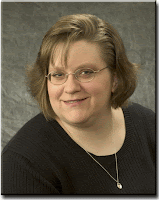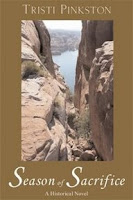

I met
Tristi Pinkston through
LDStorymakers. Shortly after I met her I read her completely engaging and well written book called, Strength to Endure. Knowing that Tristi has a new book out, I thought it would be fun to interview her on this blog. One of the complaints I've heard from folks at various book groups and settings is that many LDS novels are "fluff." I assure you that Tristi's books are not fluff. But that doesn't mean they are stuffy either, instead they are great reads.
1. How many books do you have out and what are their titles?
I currently have three books out. The first is "Nothing to Regret," the
second is "Strength to Endure," and my new release is called "Season of
Sacrifice."
2. You have a passion for writing historical fiction, having a book dealing with the Interment camps during WWII and one set in Nazi Germany. What is your latest book about?
My first two books deal with world history, but my third deals with the
history of the LDS Church. My great-great-grandfather, Benjamin Perkins,
engineered the passage through the Hole in the Rock in southern Utah, and
really lived a remarkable life. I wanted to tell his story in a way that
would honor his life and the man he was.
3. Tell us a little about how much research you need to do before you start writing, how you go about researching, and finally what your method is of putting it all together.
I start out with just a speck of an idea for a plot. Then I get my hands
on all the information I can about the era I've chosen. I'll get movies
set in that time and in the place I'm writing about, I'll get fiction and
nonfiction books, and I'll hit the Internet. I'll completely immerse
myself in that time and culture. I take pages and pages of notes on
clothes, speech, customs and historical events. As I go, certain things
will jump out at me that I know for sure I want to include in my story.
This usually takes me around a month.
Then I type up my notes, and get to work on the story. I make a timeline
so I know when all the historical events took place, and then I decide
where I want my characters to be when it happens and what their reaction
to it will be.
Then I start my rough draft. As I write, I'll discover that there are
details I need that I don't have. Sometimes I'll come back and add it
later, or sometimes I'll stop right then, hit the Internet, find what I
need, and keep writing. I keep watching the movies and reading the books
throughout this time to keep myself immersed. I find it lends more
authenticity to the final product.
When I do my second draft, I'm especially careful to take note of how I
incorporated the historical facts in the first draft. I hate info dumps
(where the author interrupts the story to tell the reader what's going on)
so I try to avoid those as much as I possibly can.
4. How and when did you discover both your passion for writing and your talent for writing?
I've always had a vivid imagination and I don't remember a time when I
wasn't creating a story in my mind. I wrote my first story at age five,
dabbled in bad poetry in my teenage years, and wrote something decent in
my early twenties. That became "Nothing to Regret," my first published
novel.
5. If you had to describe your latest book in one sentence—what would it be?
Intrepid pioneers face seemingly impossible challenges, but conquer them
through faith in God.
6. Who are you favorite authors?
I grew up on Louisa May Alcott, Gene Stratton-Porter, Lewis Carroll, L. M.
Montgomery, and all those greats. I still adore those books and am
excited to see my daughter now reading them. These days I enjoy Dee
Henderson, Jan Karon, Juliet Marillier, Catherine Marshall, and I really
enjoy cosy mysteries.
7. Do you have a muse, and if so, who or what?I can't trace my inspiration to any one person or thing. I get ideas from
the strangest things. "Nothing to Regret" came from a dream I had that I
was a man doing espionage work in Japan during World War II. "Strength to
Endure" came to me in the middle of Relief Society one day when I heard
the story of a death march out of a concentration camp. "Season of
Sacrifice" was inspired by family history books and journals. Other books
on my drawing board were inspired by dreams, news stories, overheard
conversations . . . I think the biggest key to finding your muse is to
keep your eyes and ears open. Everything is a potential story.
8. And finally what are you currently working on and what are your writing goals?
I just finished a contemporary mystery about a Relief Society presidency
who decides to take the law into their own hands. It's been such a joy to
write -- I just let my characters have their head and away we went. Those
are some seriously kooky ladies, let me tell you. There will be a sequel
to the book and I'm mulling it over right now.
As far as my goals are concerned, I would like to publish a book a year
and continue to write historical fiction and contemporary. I derive a lot
of joy from both. I'd like to touch up some manuscripts I wrote a few
years ago, completely redo a historical fiction novel I started when I was
fifteen, and write for the rest of my life. I love it, I really do.

